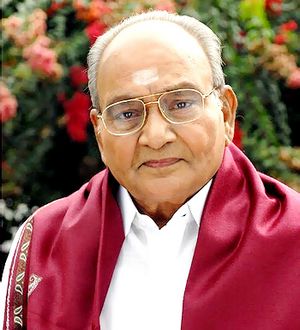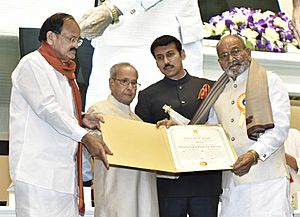K. Viswanath facts for kids
Quick facts for kids
K. Vishwanath
|
|
|---|---|

Viswanath in 2014
|
|
| Born |
Kasinadhuni Viswanath
19 February 1930 |
| Died | 2 February 2023 (aged 92) |
| Occupation |
|
| Years active | 1951–2023 |
|
Works
|
Full list |
| Awards | Padma Shri (1992) Dadasaheb Phalke Award (2016) |
Kasinadhuni Viswanath (born February 19, 1930 – died February 2, 2023) was a famous Indian film director, screenwriter, and actor. He was known for his unique style in Telugu cinema, often mixing serious art films with popular movies. His work was recognized around the world.
Viswanath received the "Prize of the Public" at the Besançon Film Festival in France in 1981. In 1992, he was honored with the Padma Shri, a high award from the Indian government, for his contributions to art. Later, in 2017, he received the Dadasaheb Phalke Award, which is the highest award in Indian cinema.
He started his career working with sound in films. Over sixty years, he directed 53 feature films. His movies often explored themes like performing arts, visual arts, and poetry. Viswanath's films also bravely discussed important social issues. These included problems like caste differences, skin color discrimination, disability, and gender inequality.
Some of his most famous films include Sankarabharanam (1980) and Sagara Sangamam (1983). Both were listed among the "100 greatest Indian films of all time" by CNN-IBN. Sankarabharanam and Saptapadi (1981) won National Film Awards. Many of his films were shown at international film festivals, like the Moscow International Film Festival. His film Swathi Muthyam (1986) was even chosen as India's official entry for the Academy Awards.
Viswanath won many awards throughout his career. These include five National Film Awards, seven Nandi Awards (state awards), and ten Filmfare Awards South. He also won a Filmfare Award for his work in Hindi cinema.
Contents
Early Life and First Steps in Film
Kasinadhuni Viswanath was born on February 19, 1930, in Repalle, Andhra Pradesh. His family came from a small village called Pedapulivarru. He studied science at Andhra Christian College.
He began his film journey as a sound recordist at Vauhini Studios in Chennai. His father also worked there. Viswanath learned a lot from A Krishnan, who was the head of sound engineering. Later, he became an assistant director. He worked with famous directors like Adurthi Subba Rao.
A Career in Directing
Viswanath started directing films in 1965 with Aatma Gowravam. This movie won the Nandi Award for Best Feature Film. He then directed several films that focused on women's stories, such as Chelleli Kapuram (1971) and Jeevana Jyoti (1975). His unique artistic style became very clear in Siri Siri Muvva (1976).
His film Sankarabharanam (1980) is a classic. It showed how traditional Indian music was being forgotten and helped bring back interest in Carnatic music. This movie was a huge success and played in cinemas for over a year.
Viswanath's films often featured characters with different challenges. For example, Sarada (1973) was about a woman with psychological issues. Swathi Muthyam (1986) showed the kindness of an autistic man. Sirivennela (1986) explored the lives of deaf and mute characters. His movies always aimed to show how people can be more understanding and accepting.
Films About Society
Viswanath made many films that talked about important social issues.
- In Saptapadi, he spoke out against untouchability and the caste system.
- Subhodayam and Swayam Krushi highlighted the importance and dignity of manual labor.
- Subhalekha humorously dealt with the problem of the dowry system.
- Sutradharulu encouraged society to embrace non-violence.
- Swati Kiranam showed the dangers of envy and anger.
Even with these serious topics, Viswanath's films were always entertaining. They had imaginative stories and clear messages. He believed that movies could help bring positive changes to society.
Working with Poornodaya Creations
Edida Nageswara Rao started "Poornodaya Movie Creations." This company helped Viswanath make many of his artistic films. Some of these include Sankarabharanam, Swatimutyam, and Saagarasangamam. Many of these films were even translated into Russian and shown at the Moscow Film Festival.
Directing Hindi Films
Viswanath also directed several films in the Hindi language. These include Sargam (1979), Kaamchor (1982), and Eeshwar (1989). Some of his Hindi films, especially those with actress Jaya Prada, were very popular.
Acting Roles
In 1995, Viswanath started acting in films himself, beginning with the Telugu movie Subha Sankalpam. He played many different characters in both Telugu and Tamil films. Some of his notable acting roles were in Kalisundam Raa (2000), Santosham (2002), Tagore (2003), and Lingaa (2014).
Television Work
Besides films, Viswanath also acted in a few television shows. He appeared in serials like Siva Narayana Teertha and Chellamay. He also appeared in television commercials for brands like GRT Jewellers.
Personal Life
K. Viswanath was married to Kasinadhuni Jayalakshmi. The actor Chandra Mohan and singers S. P. Balasubrahmanyam and S. P. Sailaja were his cousins.
Viswanath passed away on February 2, 2023, in Hyderabad, at the age of 92.
Filmography
K. Viswanath directed 53 feature films.
Directed Films
| Year | Film | Language | Credits | Notes |
|---|---|---|---|---|
| 1965 | Aatma Gowravam | Telugu | Director | Won Nandi Award for Best Feature Film (Bronze); his first film as a director |
| 1971 | Chelleli Kapuram | Telugu | Director | Won Nandi Award for Best Feature Film (Gold) |
| 1972 | Kalam Marindi | Telugu | Story, screenplay writer and director | Won Nandi Award for Best Feature Film (Gold) |
| 1973 | Sarada | Telugu | Director | Won Nandi Award for Best Feature Film (Gold) |
| 1974 | O Seeta Katha | Telugu | Director | Won Nandi Award for Best Feature Film (Silver) and Filmfare Award for Best Film – Telugu |
| 1975 | Jeevana Jyothi | Telugu | Director | Won Nandi Award for Best Feature Film (Gold) and Filmfare Award for Best Film – Telugu |
| 1976 | Siri Siri Muvva | Telugu | Story, screenplay, writer and director | |
| 1979 | Sankarabharanam | Telugu | Story writer and director | Won "Prize of the Public" at Besançon Film Festival; National Film Award for Best Popular Film |
| 1979 | Sargam | Hindi | Director | Hindi version of Siri Siri Muvva |
| 1981 | Saptapadi | Telugu | Story, screenplay writer and director | Won National Film Award for Best Feature Film on National Integration |
| 1982 | Kaamchor | Hindi | Director | Hindi version of Subhodayam |
| 1982 | Subhalekha | Telugu | Story, screenplay, writer and director | Won Filmfare Award for Best Direction |
| 1983 | Sagara Sangamam | Telugu | Story-writer and director | Won Nandi Award for Best Feature Film (Bronze) and Filmfare Award for Best Direction |
| 1985 | Swathi Muthyam | Telugu | Story, screenplay, writer and director | India's Official Entry for Best Foreign Language film at the 59th Academy Awards; Won National Film Award for Best Feature Film in Telugu |
| 1986 | Sirivennela | Telugu | Story, screenplay, writer and director | |
| 1987 | Sruthilayalu | Telugu | Story, screenplay, writer and director | Won Nandi Award for Best Direction and Filmfare Award for Best Direction |
| 1987 | Swayamkrushi | Telugu | Story, screenplay, writer and director | Screened at Moscow International Film Festival |
| 1988 | Swarnakamalam | Telugu | Story, screenplay, writer and director | Won Nandi Award for Best Feature Film (Gold) and Filmfare Award for Best Film – Telugu |
| 1989 | Eeshwar | Hindi | Story, screenplay, writer and director | Hindi version of Swathi Muthyam |
| 1989 | Sutradharulu | Telugu | Story, screenplay, writer and director | Won National Film Award for Best Feature Film in Telugu |
| 1992 | Aapadbandhavudu | Telugu | Story, screenplay, writer and director | Won Nandi Award for Best Feature Film (Bronze) and Filmfare Award for Best Direction |
| 1995 | Subha Sankalpam | Telugu | Director and Actor | Won Filmfare Award for Best Direction |
| 2004 | Swarabhishekam | Telugu | Actor, story, screenplay writer and director | Won National Film Award for Best Feature Film in Telugu |
| 2010 | Subhapradam | Telugu | Director |
Acting Roles
| Year | Film | Role | Language |
|---|---|---|---|
| 1995 | Subha Sankalpam | Raayudu | Telugu |
| 2000 | Kalisundam Raa | Raghavayya | Telugu |
| 2001 | Narasimha Naidu | Raghupathi Naidu | Telugu |
| 2002 | Santosham | Ramachandrayya | Telugu |
| 2003 | Tagore | Chief Minister | Telugu |
| 2004 | Swarabhishekam | Srinivasachari | Telugu |
| 2005 | Athadu | CBI Officer | Telugu |
| 2008 | Yaaradi Nee Mohini | Keerti's grandfather | Tamil |
| 2014 | Lingaa | Karunakara | Tamil |
| 2015 | Uttama Villain | Poornachandra Rao | Tamil |
Other Film Roles
| Year | Film | Language | Credits |
|---|---|---|---|
| 1951 | Pathala Bhairavi | Telugu, Tamil | Assistant Director |
| 1957 | Thodi Kodallu | Telugu | Audiographer |
| 1964 | Mooga Manasulu | Telugu | Assistant director |
| 1968 | Sudigundalu | Telugu | Writer |
Awards and Honours
Viswanath received many important awards for his work in cinema:
- Civilian Honour:
* Padma Shri (1992) from the Government of India.
- International Honours:
* "Prize of the Public" at the Besançon Film Festival of France (1981). * Special Mention at the Moscow International Film Festival (1982–87).
- National Film Awards:
* Dadasaheb Phalke Award (2017) for lifetime achievement. * Best Popular Film – Sankarabharanam (1980). * Best Film on National Integration – Saptapadi (1982). * Best Feature Film in Telugu – Swathi Muthyam (1987), Sutradharulu (1990), Swarabhishekam (2005).
- Nandi Awards (State Awards):
* Best Director – Swathi Muthyam (1986), Sruthilayalu (1987). * Raghupathi Venkaiah Award (1992) for lifetime achievement in Telugu cinema.
- Filmfare Awards South:
* Best Director for many films including O Seeta Katha (1974), Sagara Sangamam (1983), and Swathi Muthyam (1986). * Lifetime Achievement Award (1994).
- Other Awards:
* Filmfare Best Story Award for Eeshwar (1989). * CineMAA Award for lifetime achievement (2008). * Lifetime Achievement Award (2021).
- Honorary Doctorate:
* Received an honorary degree from Potti Sreeramulu Telugu University.
 | Percy Lavon Julian |
 | Katherine Johnson |
 | George Washington Carver |
 | Annie Easley |


